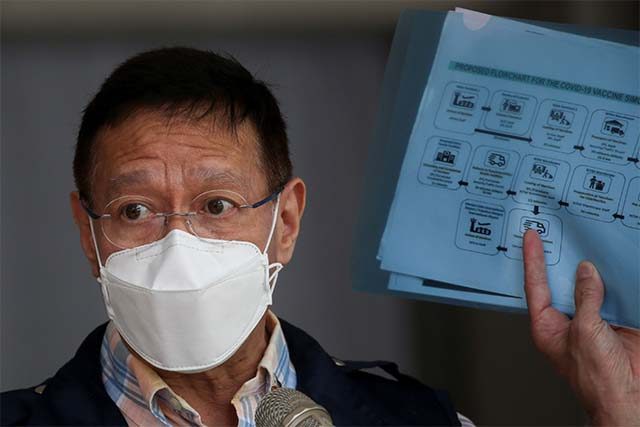
Health Secretary Francisco Duque earned online criticisms anew for the perceived lack of planning in the proposal to place the entire country under a more relaxed quarantine phase amid the still raging coronavirus pandemic.
The Inter-Agency Task Force for the Management of Emerging Infectious Diseases last Friday concurred to place the entire Philippines under the modified general community quarantine to help revive the economy devastated by the past strict lockdowns imposed to contain the spread of the virus which causes COVID-19.
Last week, acting Socioeconomic Planning Secretary Karl Chua also made this suggestion in a Cabinet’s meeting with President Rodrigo Duterte, citing the return of workers will mitigate income loss brought by pandemic.
READ: Apprehensions over NEDA’s proposal to place Metro Manila under MGCQ in March
The IATF-MEID’s recommendation is up for approval from Duterte.
Duque’s claims of preparedness
In an interview with CNN Philippines’ “The Source” on Monday, Duque expressed confidence that the Philippines, especially the National Capital Region, is prepared for the shift to MGCQ, citing manageable infection rates.
“I think we’re ready. Because after one year, we have kept our infection rate manageable, which means it does not overwhelm the healthcare system. LGUs (local government units) have been increasingly effective,” he said.
However, when asked about the preparedness of hospitals in Manila in case of a spike in infections, Duque just said he thinks the healthcare system could handle it.
“So far tingin natin, kakayanin, kakayanin naman. We will never be able to know until that situation actually evolves, whether the system is ready,” the health secretary said.
“We’ll see. The important thing is we are nimble, we are agile,” he added.
He also claimed that the NCR can always revert to stricter measures if the need arises.
No plan of action?
Some Filipinos then slammed Duque for his remarks which were perceived to be an indication of uncertainty in the government’s plan to place the country under MGCQ.
They recalled similar assurances by the health secretary back when COVID-19 cases were just starting to spread in the country.
“Ayan na naman ang kakayanin. Narinig na yan dati pa,” a Twitter user said.
“Hindi pa siya nakuntento sa mga sinugal na buhay niya since Feb 2020,” another said.
“Action muna tas saka titingnan ang data. ‘We’ll see’ is not something you want to hear from a medical professional,” screenwriter Anj Pessumal said.
Duque was also adamant when concerns were raised if Metro Manila will experience the same condition as Central Visayas, which is one of the regions under MGCQ.
The region experienced a spike of infections last week. Of these cases, mutations of the virus were also detected.
“It will not affect it because NCR is a different region,” the health secretary said.
Some Filipinos likewise criticized Duque for this remark, citing the Department of Health‘s poor responses to these public health incidents.
“O, tumaas lalo ang bilang ng kaso sa Cebu. Gawin din natin sa Metro Manila na mas maraming tao,” one user said.
Another interpretation
Statistician Edson Guido noted that the data interpretation should not only be based on the hospital bed capacity, citing figures of infected patients who are not admitted.
“Numbers show that our health system isn’t overwhelmed. But we also know that not everyone gets proper hospital care. In fact, out of the 12,068 COVID-19 deaths in the Philippines, latest data from DOH show that only 4,563 of these patients were admitted to a hospital,” Guido wrote.
Others agreed with this explanation and noted the high price of hospital care, especially in private hospitals.
Physician Gene Nisperos of the University of the Philippines, meanwhile, said that the government should re-think it’s strategies in resolving the pandemic.
“The narrative should not be whether to put Metro Manila under MGCQ or not. Changing classifications of quarantine is not enough! What govt should do is to change its thinking and decision making in this pandemic!” Nisperos said.
“It can begin by changing the IATF and DOH leadership ASAP,” he added.









